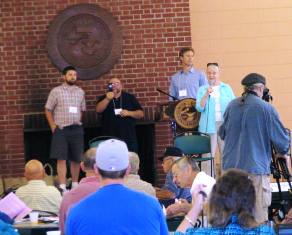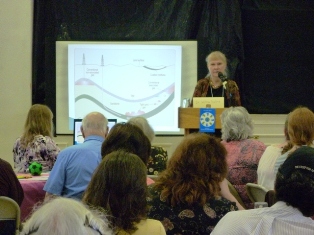|
July 29, 2013
Educational Meeting This Thursday, August 1, 2013 at Normantown Elementary, Normantown, WV
If you missed the educational events descibed in detail below, there will be an opportunity hear from some of the presenters at an informational meeting later this week in Gilmer County. The meeting is Thursday, August 1 at 6:30 PM at Normantown Elementary School in Normantown. Speakers and topics to be discussed include Bill Hughes of the Wetzel County Action Group with a primer on all the big trucks and heavy equipment on our roads -- what they are, what they do and what drilling phase is happening when certain trucks and equipment arrive at a well site truck and equipment primer; Diane Pitcock of the WV Host Farms Program with a “Fracking 101” presentation and what to expect when drilling starts nearby, and members of the Doddridge County Watershed Association on how to start a watershed group in your area. Julie Archer of WV-SORO will also be there with information and resources. The meeting has been organized by local WV-SORO members and concerned citizens of Gilmer County.
Wellness & Water II, Marcellus Academy Educate Landowners, Activists and Others About the Impact of Fossil Fuel Extraction
You know some major problems exist when nearly 75 people devote a large amount of time on a summer weekend to exploring an issue in depth. On June 29-30, 2013, the second Wellness & Water public education event was held in Buckhannon, WV. Starting with the first event in September 2012, these gatherings have provided opportunities for members of environmental organizations and allied groups like our Surface Owners’ Rights Organization (WV-SORO), and other concerned citizens to gather for networking and information sharing opportunities. In addition to WV-SORO, co-sponsors of this year’s event were the Doddridge County Watershed Association, the Ohio Valley Environmental Coalition, the WV Chapter of the Sierra Club and the WV Highlands Conservancy.
Plenary speakers for the event included scientific experts like Yuri Gorby of Rensselaer Polytechnic Institute, public policy experts like Leslie Fields of the Sierra Club, and progressive thinkers like Grant Smith of the Civil Society Institute. Representatives from various organizations which seek to provide information and assistance to people who are concerned about their water quality and/or finding alternatives to fossil fuel usage were also on hand to lead workshops and participate in panel discussions. These included Marc Glass of Downstream Strategies, Rob Goodwin of Coal River Mountain Watch, and Brian Oram of B.F. Environmental Consultants. Also presenting were Dave Hanna with New Vision Renewable Energy, Samantha Malone of FracTracker, Aaron Sutch with the Mountain Institute, and Laura Rigell with the Swathmore College Divestment Campaign. Attendees also heard testimonials from five coal and gas affected residents. Many participants said that this was the most powerful portion of the program. Folks had some fun while in Buckhannon, too. The bluegrass band East Run performed on Saturday evening, and throughout the event, participants were encouraged to express themselves creatively by making "bendy stick" creations. These were judged on Sunday prior to the conclusion of the conference. Overall, it was a great weekend.
Wellness & Water II participants agreed that we need to come up with processes for continued information sharing. To that end, a permanent Facebook page will be created and all who ‘Like’ the page will be able to post comments and receive information. Future events, action opportunities, and networking possibilities will be posted there, Stay tuned to our action alerts and newsletters for more information about this. Portions of this year's Wellness & Water event were video recorded and we will be posting these as soon as we can. In the meantime, you can check out videos from the 2012 conference starting with the opening greetings and a presentation by environmental scientist Dr. Wilma Subra here: http://www.youtube.com/watch?v=znFOo7CloVg (this video is part 1 of 12 -- see below for complete list of video links).
 
Left Photo: Cindy Rank of the WV Highlands Conservancy introduces Saturday mornings' panelists at this year's Wellness & Water conference (L to R: Rob Goodwin, Coal River Mountain Watch; Brian Oram, B. F. Environmental Consultants; and Marc Glass, Downstream Strategies). (Photo courtesy of Cindy Ellis, WV Highlands Conservancy) Right Photo: Dr. Wilma Subra discusses the health impacts associated with the shale gas development at the 2012 Wellness & Water conference. (Photo by Julie Archer, WV-SORO)
Two weeks following Wellness & Water (on July 13-14, 2013), more than 40 activists from around the state gathered again in Buckhannon for another educational opportunity sponsored by the WV Chapter of the Sierra Club. The goal of the club’s third annual Marcellus Academy was to provide those working to address Marcellus drilling related issues in their communities with tools to organize others, to monitor industry practices, and to help guide local and legislative leaders toward implementing sound policies to address these issues.
On Saturday morning, Dr. Michael McCawley of the WVU School of Public Health kicked of off the weekend with a discussion of the results and recommendations from his assessment of air, noise and light impacts from horizontal drilling operations. Gene Smith and Rick Campbell with the WV DEP Office of Oil & Gas followed with a presentation on their agency’s role in gas drilling. Later in the day, Dr. Ben Stout of Wheeling Jesuit University spoke about the mounting problems with toxic drilling waste and the proposed Green Hunter wastewater facility near in Wheeling. That evening, former State Senator and environmental advocate Charlotte Pritt, and Delegate Mike Manypenny teamed up for a presentation on the WV Legislature – Who’s Who and How It Works.
On Sunday, Alan Collins, Professor and Assistant Director, Division of Resource Management at WVU spoke about the results of the recent survey of West Virginia landowners he conducted to determine what impacts (both positive and negative) shale gas drilling has had on surface owners. (We’ll be discussing these and the results of the studies mandated by the Horizontal Well Control Act in our next WV-SORO newsletter, as we will be working to get the legislature act on the DEP's one recommendation from the studies -- to measure the setback distance from occupied dwellings from the "limit of disturbance" (edge of the pad) rather than the center.)
The weekend also featured a series of presentations focused on monitoring industry activity. This included Bill Hughes' on trucks and heavy equipment on our roads -- what they are, what they do and what drilling phase is happening when certain trucks and equipment arrive at a well site. Upshur County residents Cindy Rank and Tim Higgins presented a slide show of a near by well site from site preparation to current production phase in preparation for a visit to the site before attendees departed for home.
Robin Blakeman of the Ohio Valley Environmental Coalition and Chuck Wyrostok, Outreach Organizer with the WV Chapter of the Sierra Club contributed to this article.
Wellness & Water 2012: Health Impacts of Fossil Fuel Extraction ~ Saturday, September 8, 2012 in Morgantown, WV
For those unable to attend our first Wellness & Water conference, you can watch the entire program of speakers on the following video clips. Dr. Wilma Subra was keynote speaker, with presentations also by Dr. Michael Hendryx, Dr. Jill Kriesky, and Dr. Ben Stout. Additional speakers included residents of WV and PA who have personally been impacted by either shale gas drilling or mountain top removal coal mining and they shared their personal stories. (Thanks Bob Donnan for recording the event and providing links to the video segments.) Video of this year's conference will be available soon.
Part 1 - Opening greetings and a presentation by environmental scientist Dr. Wilma Subra who begins her presentation at the 12-minute mark of the video -- http://youtu.be/znFOo7CloVg (36:32).
Part 2 – End of presentation by environmental scientist Dr. Wilma Subra -- http://youtu.be/LiV1XAWeSac (17:04).
Part 3 - Presentation by Greene County, Pennsylvania resident Pam Judy describing the health effects her family has experienced from a compressor station that was built 780 feet from their new home -- http://youtu.be/-qVGWAZXi7s (7:14).
Part 4 - Presentation by Christina Woods of Doddridge County, West Virginia who describes problems with dust from drilling traffic on the road near their home which were compounded when flowback being was applied to the road for dust control -- http://youtu.be/vjDBCyf8Ypo (5:18).
Part 5 - Presentation by Linda Headley of Fayette County, Pennsylvania who describes how being surrounded by Marcellus Shale drilling sites has adversely affected her family' health and wellbeing -- http://youtu.be/JPIauYgBNYo (3:16).
Part 6 - Presentation by Nada White of Boone County, West Virginia who describes the health effects of coal mining and mountaintop removal -- http://youtu.be/uM9Mi1LSJDw (4:53).
Part 7 - Presentation by panelists Dr. Michael Hendryx - Professor in the School of Public Health at West Virginia University; Dr. Jill Kriesky - Center for Healthy Environments and Communities (CHEC) at University of Pittsburgh; Dr. Ben Stout - Aquatic Biologist at Wheeling Jesuit University -- http://youtu.be/umfg0PO5xg8 (31:42).
Part 8 – Q&A session with panelists Dr. Michael Hendryx - Professor in the School of Public Health at West Virginia University; Dr. Jill Kriesky - Center for Healthy Environments and Communities (CHEC) at University of Pittsburgh; Dr. Ben Stout - Aquatic Biologist at Wheeling Jesuit University -- http://youtu.be/02Gc5fjzEuM (36:33).
Part 9 – Q&A session with panelists Dr. Michael Hendryx - Professor in the School of Public Health at West Virginia University; Dr. Jill Kriesky - Center for Healthy Environments and Communities (CHEC) at University of Pittsburgh; Dr. Ben Stout - Aquatic Biologist at Wheeling Jesuit University -- http://youtu.be/OkUV8SsYR2Q (4:51)
Part 10 - Lorelei Scarbro of Raleigh County West Virginia describes what happened during and after mountaintop removal mining took place behind her house -- http://youtu.be/LLwEP1QUCX0 (9:15).
Part 11 - Danny Cook of Boone County West Virginia describes what happened during and after mountaintop removal mining took place behind his house -- http://youtu.be/DKMftkX7jgA (6:18).
Part 12 - Diane L. Pitcock describes the WV Host Farms Program -- http://youtu.be/5YhCyf-WbCg (6:30).
PowerPoint Presentations (in PDF format):
Wilma Subra - Health Impacts Associated with the Development of Shale Gas Plays
Jill Kriesky - How is Human Health Addressed in Shale Gas Drilling?
Ben Stout - Water and Air Quality Concerns with Extraction of Shale Gas
Conference Packet Materials:
FACT SHEETS (in PDF format):
Self-Reported Cancer Rates in Two Rural Areas of West Virginia with and Without Mountaintop Coal Mining
The association between mountaintop mining and birth defects among live births in central Appalachia, 1996-2003
OIL AND GAS POLLUTION Natural gas is a clean fuel? THINK AGAIN
Hydraulic Fracturing and Your Health
3 Simple Steps to Protect a Well or Spring from Marcellus Shale Fracking
NEWS ARTICLES & AFFECTED RESIDENT PROFILES:
Faces of Fracking: Meet the Headleys
Fouled Waters: Woodlands residents search for ways to survive without clean water
Methane Making An Appearance In Pa. Water Supplies
|

